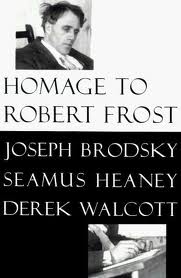 Poet Robert Frost (1874 – 1963), known for his use of colloquial American speech and rural settings, won four Pulitzer Prizes, among many other honors and recognitions. By the time I was in junior high and high school, his poetry was in all the American literature textbooks; he’d been published since 1914 and I assumed he had always been well known.
Poet Robert Frost (1874 – 1963), known for his use of colloquial American speech and rural settings, won four Pulitzer Prizes, among many other honors and recognitions. By the time I was in junior high and high school, his poetry was in all the American literature textbooks; he’d been published since 1914 and I assumed he had always been well known.
What I didn’t know was that to took World War II to make his work known to the general public. In Homage to Robert Frost by Joseph Brodsky, Seamus Heaney and Derek Walcott, Brodsky tells us that in 1943, the U.S. War Council distributed – as a morale builder – 50, 000 copies of Frost’s “Come In, And other Poems” to U.S. troops stationed overseas.
That thought is rather staggering – a book of poetry distributed to troops as a morale builder.
Brodsky, Heaney and Walcott all received the Nobel Prize for literature, which Frost never did. All three were born outside the United States; Frost was the quintessential New Englander. And in this collection of essays, each pays homage to a poet who enormously influenced them and their poet generations.
In his essay, taken from a seminar he taught in Paris, Brodsky explicates two Frost poems – “Come In” (the title poem from that World War II collection) and “Home Burial, ” which may have been based upon the death (from cholera) of Frost’s firstborn child. Brodsky takes a journey through both poems, weaving a narrative that is both deep and suspenseful.
Heaney discusses “Home Burial” in less detail, but also covers “Stopping by Woods on a Snowy Evening” (known to generations of schoolchildren, including me), “Birches, ” “Desert Places” and several others. He focuses on the sounds of Frost’s poetry, their “bracing lyric power.”
Walcott also discusses “Stopping by Woods on a Snowy Evening” but goes beyond a simple discussion and explication, considering Frost an autocratic rather than democratic poet and looking at the “scars of devastation” from Frost’s personal life and how it affected his poetry.
The three essays were not written for the purpose of a volume of homage to Frost; Brodsky’s was written for The New Yorker in 1994; Heaney’s for Salmagundi in 1989; and Walcott’s for The New Republic in 1995. The three were assembled and published by Farrar Straus & Giroux in 1996.
To have three Nobel Prize winners recognize the value and importance of a poet’s work is homage indeed.
- Poets and Poems: Sandra Marchetti and “Diorama” - April 24, 2025
- Poets and Poems: Christina Cook and “Roaming the Labyrinth” - April 22, 2025
- Longfellow’s “Paul Revere’s Ride”: Creating a National Legend - April 17, 2025
Megan Willome says
I did not know about the WW2 connection–thanks for sharing. My favorite poetic tribute to Robert Frost is a poem called “Thanks, Robert Frost” by David Ray. I probably found it on the Writer’s Almanac.
Maureen Doallas says
Good post, Glynn. Frost is one of my only’s favorite poets.